a&e features
Diane Rehm successor is not who you’d expect
Out ‘1A’ host Joshua Johnson is passionate journalist first and foremost
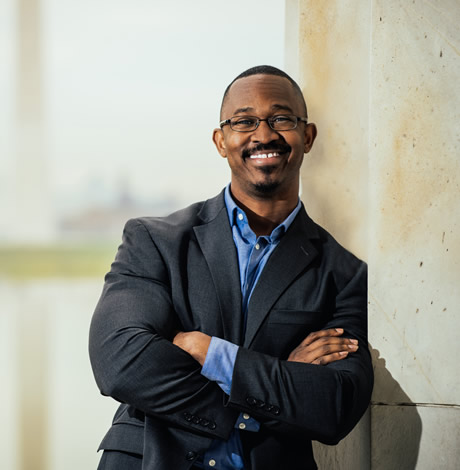
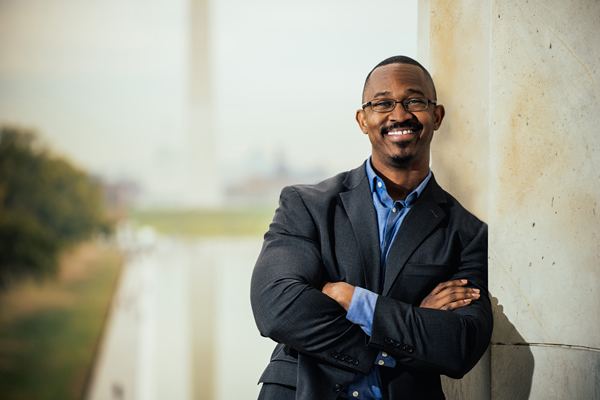
Joshua Johnson says launching a new daily two-hour radio show is a ‘mountain of work even under the best of circumstances.’ (Photo courtesy WAMU)
It was last Halloween weekend when Joshua Johnson got the call that he’d been named Diane Rehm’s successor.
Rehm, who began her eponymous National Public Radio call-in show in 1979, retired in December and as of Jan. 2, WAMU broadcasts a new show, “1A” in what had been “The Diane Rehm Show’s” timeslot.
Johnson had subbed for Rehm two days last September and shadowed her another day. Based in San Francisco for the last six-and-a-half years where he was morning news host for KQED while also teaching podcasting at the University of California (Berkeley), Johnson was in Palm Springs visiting friends with Joe Gallagher, his boyfriend of a year and a half, when he got the call. He says it’s a moment he’d been working toward since age 6.
“This wave of peace washed over me and I just got very calm,” says the 36-year-old South Florida native. “It was like my fists finally unclenched after weeks of waiting. I didn’t have that moment of, ‘Oh my God, I’m going to do the show.’ It was just kind of like, ‘Finally — I’ve been waiting on this for my entire life and now it’s going to happen.”
“1A” is a live, two-hour daily WAMU radio program distributed nationally by NPR each weekday at 10 a.m. that seeks to “provide deep conversation about the thorniest issues of our time delivered with insight, intimacy and personality.” It’s both a new, freestanding show but also a successor to the Rehm show, whose “legacy of civil dialogue and analysis” its team hopes to continue.
Producers were initially almost certain they’d hire a woman to succeed Rehm.
“We weren’t 100 percent sure, but you know, sort of in the high 80s or 90s,” says Rupert Allman, “1A’s” executive producer. Johnson won the search team over, Allman says, with his “huge relatability.”
“There was something about his own curiosity and his manner that was really appealing,” he says. “Especially the idea that he was very much interested in civil dialogue, taking time to develop arguments and not always chasing the next shiny ball. Those pieces came together and the stars began to align and that was it.”
Nobody’s universally loved in this era of Internet trolling, but early signs are strong for Johnson. “1A” is being carried on 204 stations with more expected in April (“The Diane Rehm Show” was carried on 198) and WAMU says the show was the No. 1 regional performer in its time slot throughout January, the latest month for which figures were available. WAMU says it expects the show will have a weekly audience of about 2.5 million soon based on early numbers.
Johnson, as loquacious as you’d expect, sat with the Blade in a WAMU conference room on Feb. 16. His comments have been edited for length.
WASHINGTON BLADE: How do you feel it’s going so far?
JOSHUA JOHNSON: It’s going well. Very, very busy. There’s no lack of things to talk about for sure, but it’s good. Launching a national show, any new show, is a heavy lift to say the least, but we have an amazingly good team and we’ve had lots of support from listeners and stations. We’ve found interesting ways to talk about what’s going on in the world and to divert from the headlines that have everyone’s attention to talk about other topics that may be getting lost in the shuffle around the new administration. And we’ve also found ways to take a breath and just do topics that are fun or different as a little relief from the top of the news cycle, so I think it’s been good.
BLADE: What’s your strategy to turn this into more of a Johnny Carson-to-Jay Leno kind of succession as opposed to, say, a Pat Sajak kind-of thing?
JOHNSON: The only thing we can do is control each day’s program and that’s what I try to focus on. I never worry about the 37 years that came before me. That’s Diane’s legacy and that’s solid and done. …. If you worry too much about the distant future, you miss the opportunity to really knock out today.
BLADE: Has the learning curve been about what you thought it would be?
JOHNSON: I tried to come in with very few expectations other than it would be really, really hard and it has been. …. But we’ve gone down from me working like 16-17-hour days to more like 12-13, so that’s a big step forward. … It’s just a mountain of work even under the best of circumstances.
BLADE: What’s been your favorite episode so far?
JOHNSON: I don’t have one. We did a Sunday show a few weeks ago on the immigration ban and we just let stations air it if they wanted to. … But we probably haven’t done my favorite show yet or even conceived of it. I think for me to start grabbing onto favorites at this point would set the bar too low for what we want to be. I don’t think what we’ve done in our first month will compare to what we’ll be doing a year from now or five years from now.
BLADE: When things are crazy, do you get energized or stressed by that?
JOHNSON: Probably a little bit of both. I tend to be the kind of person that the crazier things are around me, the calmer I get, which is how I survived breaking news. … But you have to be on the outer edge of your comfort zone in order to grow, so I just accepted that that was going to be the way it was going to be some days or maybe even most days.
BLADE: Was it hard to leave San Francisco?
JOHNSON: It was really, really hard … but this opportunity was worth it.
BLADE: Have you had any time to explore Washington much yet?
JOHNSON: No. I live a few blocks from the station here in Van Ness, so I walk to work because I cannot take a snow day. And everything I need is right here, the grocery store, the gym and so on. Once I get a better handle on the workload, I’ll be able to get out more and see the city.
BLADE: Were you intimidated to accept?
JOHNSON: Not really. …. I think I was more grateful and humble. … I felt very ready. Like, “Yeah — I’ve been preparing for this for 30-plus years.”
BLADE: You say you had this dream since age 5 or 6. How was this type of thing even on your radar at that age?
JOHNSON: Well, Kermit the Frog played a reporter on “Sesame Street.” …. I grew up seeing Ed Bradley on “60 Minutes” or Bernard Shaw on CNN or Dwight Lauderdale on my local Miami ABC station. Seeing those black men doing what I wanted to do just instantly clicked for me. I always had an affinity for broadcasting. I just didn’t know what form it would take.
BLADE: So was it something you chose or did it choose you?
JOHNSON: Well, it has to be both. Just because destiny knocks doesn’t mean you have to answer. It went through a lot of permutations of whether I would answer or how I would answer and then eventually it became that one thing that I knew if I didn’t go after, I’d regret the rest of my life.
BLADE: Had you been a big listener of “The Diane Rehm Show”?
JOHNSON: Yeah, I listened to her in South Florida on the station where I grew up, WLRN. I never thought I’d be her successor, but yeah, I listened to her for years.
BLADE: How do you decide on the balance between meat-and-potatoes news topics and lighter stuff?
JOHNSON: I don’t think it’s a matter of balancing lightness against substance. The show we did on country music was very substantive. What we’re always trying to figure out is what is it about today’s show that a fan would tell their friends, “You gotta listen to today’s ‘1A.’” Why? How do you answer that? if you start there and work backwards, you can build a great show. So even if it’s a lighter topic like country music today or the Grammy Awards or the Super Bowl, we never want it to feel like, “OK everybody, we know life is really hard so we’re just gonna give you some sugar and candy for an hour.” That’s not good enough. Even if it’s not politics or not some trouble-in-the-world topic, it still has to be time well spent. Plus, I get bored easily, so I get tired of talking about the troubles of the world all day. …. It can’t be all sugar but it can’t be all steak.
BLADE: Some people are saying there’s been more sugar though lately. The Super Bowl show got some flak.
JOHNSON: It depends whose table you’re dining at. I think there are different ways to talk about different things. I did have a listener who got very snooty about the Super Bowl show …. but there are many aspects to a cultural event like that that are worthy of discussion. … Just because people listen to NPR doesn’t mean they don’t watch football and just because they listen to NPR doesn’t mean they don’t like pop music.
BLADE: True, but hasn’t NPR always sort of been that hub where you could get something you couldn’t just get anywhere else? If ESPN is doing round-the-clock sports coverage, do we really need to hear about sports on NPR too?
JOHNSON: But we don’t talk about the Super Bowl like ESPN would talk about it. We didn’t get caught up in stats and who’s up and who’s down. We talked about it more broadly, about what was going on in Houston and sort of the politics around the event, the cost of buying an ad there and so on. We tried to make it really fun. One thing public media serves is to give people a diverse view on the world. Anybody who thinks public media is designed to be all meat and potatoes all the time has clearly never heard “Car Talk” or “Wait Wait … Don’t Tell Me.” … These are just wonderful shows that are about interesting things that make life worthwhile and we can’t pretend that doesn’t matter.
BLADE: Does the “1A” format give you more opportunity to weigh in than other journalism posts you’ve had?
JOHNSON: No. My job is still to be an analyst of the day’s events. This is not the Joshua Johnson show. It’s not my platform to tell you what I think about the news. I’m still a reporter. But that doesn’t mean I can’t call out inconsistencies. The other day we had a guest who kind of fudged an answer on climate change and I (called him out). But I can do it in a way that hews to evidence and fact and not just my belief.
BLADE: There’s so much obfuscation in partisan discussions, though. How do you press people for clarity without sounding partisan, at least at times?
JOHNSON: The way we’ve been doing it —what we do works. You do your homework, you do smart shows, you ask smart questions and you don’t worry about whether people like you or are comfortable with it. I’m here to perform a service as a journalist. … For me to start worrying about it now is to doubt the very reasons I came here. Facts still matter, the truth is still the truth and there are still such things as facts. People know and understand what the NPR standard is and outlets that don’t follow that standard — I don’t need to worry about people who deal in that kind of foolishness.
BLADE: How do you decide if you’re going to pick up a thread after a break or not?
JOHNSON: It depends what’s coming up after the break. If we have a guest we need to get to or we have other questions that segue into that thought. Being in the studio is basically air traffic control because we have guests in the studio, remote guests, my script, my questions, I’m watching the clock, I have a timer that counts down to certain elements, then I have another screen that shows me e-mails and Tweets and Facebook posts and if we receive a voicemail during the show, we can play that. I have my laptop, which has more communication, I’m in touch with the control room and the newsroom upstairs and it’s all happening at once. There are all these different elements that I have to make balance so it’s a lot of plate spinning. It will be different every single day and I have to figure out in the moment what we’re going to next and if it’s duplicative of what we just said, how much time we have left and so on.
BLADE: How many people work on the show and are any of them veterans of Diane’s show?
JOHNSON: I think we have 11. Two of them were former producers on her team. The rest are new hires.
BLADE: Do you anticipate getting more mileage out of the Trump administration than you otherwise would have?
JOHNSON: There’s more to life in Washington so I don’t look to any one sector of the news as my bread and butter. … Also, public radio is very committed to the idea of localism … so we can’t allow the current political climate to eclipse all of that because then you’re basically saying that localism doesn’t matter anymore … so we keep that all in perspective.
BLADE: Even though “1A” is distributed throughout the country, doesn’t it seem slightly odd considering WAMU’s push for live and local to have brought you in from San Francisco? Some listeners were predicting a Washington person. Do you know how many names were in the hat?
JOHNSON: I don’t. I’ve heard different numbers but I honestly don’t know nor do I know who they were. As for live and local, we are live and we are a program from WAMU. I think it’s important to the DNA of public radio that local stations are a provider of national programming (gives examples). We are Washington’s NPR station and we think the ability of WAMU to produce shows like “1A” and “Big Listen” is something we can be proud of. (Allman says Johnson’s outsider status was a plus. “[We liked that] he wasn’t from D.C., is not wowed by the Beltway. He brings a completely different perspective on the country. He gives the audience something new, someone they didn’t know so it doesn’t just seem like the business of shuffling people around.”)
BLADE: You seem at times a bit more abrupt than Diane. Do you agree?
JOHNSON: I try not to be. If I interrupt, I try to apologize for it unless they’re just going off the deep end. I try to be as respectful as I can but that doesn’t mean we have time to let everybody finish their thought.
BLADE: How serious are you and your boyfriend? Any plans for him to move out here eventually as well?
JOHNSON: He owns a barbershop in San Francisco so there are some moving parts we’d have to figure out. For now, we’re doing the bicoastal thing. We’ll make it work.
BLADE: Is Millennial engagement a big push at NPR? Are NPR stations seeing the drop-off we hear about at the orchestra, the ballet, the mainline churches and so on?
JOHNSON: Millennials have gotten a bad rap. They consume immense amounts of news and information — they just do it differently. There are a lot of NPR member stations that are trying to be where younger audiences are. … We’re also getting better at saying, “Hey, maybe we don’t have a relationship now, but check this out.” Or, “We’ll try to make ourselves available in a bunch of different ways and if you only listen once or twice, that’s cool.” Or, “If you’re a fan of this podcast or station but don’t yet understand why you should give, fine.” … We’re getting better at accepting people where they are in the continuum of use in public radio. …. I think the institutions that do well are going to be the ones that skate harder in the direction the puck is going, not just going in the direction they wish it would go.
BLADE: You told Diane Rehm you hoped race would inform the program but not be the lens of the program. What’s the difference?
JOHNSON: Well, it’s about taking the experiences of your life and using them to add context to a conversation. You know, my lens on life is that I’m an African-American man in the 20th and 21st century. I can’t pretend that’s not who I am. So for me to pretend that it’s not or to pretend that I view life with no conception of race, that would be a lie. I have to acknowledge my life experiences. But at the same time as a journalist, I can step out of those experiences and try to view something from another person’s perspective. I can’t step outside of what I won’t acknowledge. It’s like taking off a shirt you don’t admit you put on. I have to own the truth of my life … but I don’t want people to feel like it’s a black man’s perspective on the news or that I’m a black man doing the news. Because I own the totality of who I am, I can step out of it as a journalist and say, “OK, let me see how people with different life experiences than me view this.”
BLADE: Did either being gay or being black pose any career hindrances?
JOHNSON: I don’t think either one was detrimental. I grew up in South Florida, which is a very gay-friendly news market. … I made a decision early on that I couldn’t make a career out of telling the truth about everyone else’s life while lying about my own. I knew eventually one of those lies would come back to bite me because one of them would be leverage for someone to use over me, so I decided I just needed to own the whole truth of my life and not let that be an impediment to my success. … Once you as a gay man deal with shame and you learn how poisonous it is, it can give you the leverage to never impute that shame on other people because it never helps, it never lifts up, it never clarifies, it never improves anything. … It burns everything it touches, so I just decided not to play with that fire because I knew what that burn feels like.
BLADE: That’s profound — what age were you? I wouldn’t have been able to articulate any of that at 16, 17, 18.
JOHNSON: I wouldn’t have been able to say that to you at that age either but I tend to be a very logical person but growing up in the Baptist church … I just thought to myself, the scriptures say you will know the truth and the truth will set you free. Well, this is the truth of my life. There has to be some freedom in here somewhere and I just held on to that. This is what the book says. This has to make sense somehow. That thought process always served me well as a journalist so how do these two things lock together? I just allowed that process to play out.
BLADE: But you make it sound so tidy. Surely there was some angst at some point, no?
JOHNSON: Oh, of course there was. This was just the ending. But yeah, there were times it was awful, it was terrible. Coming out sucks even under the best of circumstances. But working through that gave me a way to figure out where my inner reservoir of toughness came from in terms of career. I knew I had this dream and I was too greedy to give up on it.
a&e features
Visit Cambridge, a ‘beautiful secret’ on Maryland’s Eastern Shore
New organization promotes town’s welcoming vibe, LGBTQ inclusion

CAMBRIDGE, Md. — Driving through this scenic, historic town on Maryland’s Eastern Shore, you’ll be charmed by streets lined with unique shops, restaurants, and beautifully restored Victorian homes. You’ll also be struck by the number of LGBTQ Pride flags flying throughout the town.
The flags are a reassuring signal that everyone is welcome here, despite the town’s location in ruby red Dorchester County, which voted for Donald Trump over Kamala Harris by a lopsided margin. But don’t let that deter you from visiting. A new organization, Proudly Cambridge, is holding its debut Pride event this weekend, touting the town’s welcoming, inclusive culture.
“We stumbled on a beautiful secret and we wanted to help get the word out,” said James Lumalcuri of the effort to create Proudly Cambridge.
The organization celebrates diversity, enhances public spaces, and seeks to uplift all that Cambridge has to share, according to its mission statement, under the tagline “You Belong Here.”
The group has so far held informal movie nights and a picnic and garden party; the launch party is June 28 at the Cambridge Yacht Club, which will feature a Pride celebration and tea dance. The event’s 75 tickets sold out quickly and proceeds benefit DoCo Pride.
“Tickets went faster than we imagined and we’re bummed we can’t welcome everyone who wanted to come,” Lumalcuri said, adding that organizers plan to make “Cheers on the Choptank” an annual event with added capacity next year.
One of the group’s first projects was to distribute free Pride flags to anyone who requested one and the result is a visually striking display of a large number of flags flying all over town. Up next: Proudly Cambridge plans to roll out a program offering affirming businesses rainbow crab stickers to show their inclusiveness and LGBTQ support. The group also wants to engage with potential visitors and homebuyers.
“We want to spread the word outside of Cambridge — in D.C. and Baltimore — who don’t know about Cambridge,” Lumalcuri said. “We want them to come and know we are a safe haven. You can exist here and feel comfortable and supported by neighbors in a way that we didn’t anticipate when we moved here.”

Lumalcuri, 53, a federal government employee, and his husband, Lou Cardenas, 62, a Realtor, purchased a Victorian house in Cambridge in 2021 and embarked on an extensive renovation. The couple also owns a home in Adams Morgan in D.C.
“We saw the opportunity here and wanted to share it with others,” Cardenas said. “There’s lots of housing inventory in the $300-400,000 range … we’re not here to gentrify people out of town because a lot of these homes are just empty and need to be fixed up and we’re happy to be a part of that.”
Lumalcuri was talking with friends one Sunday last year at the gazebo (affectionately known as the “gayzebo” by locals) at the Yacht Club and the idea for Proudly Cambridge was born. The founding board members are Lumalcuri, Corey van Vlymen, Brian Orjuela, Lauren Mross, and Caleb Holland. The group is currently working toward forming a 501(c)3.
“We need visibility and support for those who need it,” Mross said. “We started making lists of what we wanted to do and the five of us ran with it. We started meeting weekly and solidified what we wanted to do.”
Mross, 50, a brand strategist and web designer, moved to Cambridge from Atlanta with her wife three years ago. They knew they wanted to be near the water and farther north and began researching their options when they discovered Cambridge.
“I had not heard of Cambridge but the location seemed perfect,” she said. “I pointed on a map and said this is where we’re going to move.”
The couple packed up, bought a camper trailer and parked it in different campsites but kept coming back to Cambridge.
“I didn’t know how right it was until we moved here,” she said. “It’s the most welcoming place … there’s an energy vortex here – how did so many cool, progressive people end up in one place?”
Corey van Vlymen and his husband live in D.C. and were looking for a second home. They considered Lost River, W.Va., but decided they preferred to be on the water.
“We looked at a map on both sides of the bay and came to Cambridge on a Saturday and bought a house that day,” said van Vlymen, 39, a senior scientist at Booz Allen Hamilton. They’ve owned in Cambridge for two years.
They were drawn to Cambridge due to its location on the water, the affordable housing inventory, and its proximity to D.C.; it’s about an hour and 20 minutes away.
Now, through the work of Proudly Cambridge, they hope to highlight the town’s many attributes to residents and visitors alike.
“Something we all agree on is there’s a perception problem for Cambridge and a lack of awareness,” van Vlymen said. “If you tell someone you’re going to Cambridge, chances are they think, ‘England or Massachusetts?’”
He cited the affordability and the opportunity to save older, historic homes as a big draw for buyers.
“It’s all about celebrating all the things that make Cambridge great,” Mross added. “Our monthly social events are joyful and celebratory.” A recent game night drew about 70 people.
She noted that the goal is not to gentrify the town and push longtime residents out, but to uplift all the people who are already there while welcoming new visitors and future residents.
They also noted that Proudly Cambridge does not seek to supplant existing Pride-focused organizations. Dorchester County Pride organizes countywide Pride events and Delmarva Pride was held in nearby Easton two weeks ago.
“We celebrate all diversity but are gay powered and gay led,” Mross noted.
To learn more about Proudly Cambridge, visit the group on Facebook and Instagram.
What to see and do
Cambridge, located 13 miles up the Choptank River from the Chesapeake Bay, has a population of roughly 15,000. It was settled in 1684 and named for the English university town in 1686. It is home to the Harriet Tubman Museum, mural, and monument. Its proximity to the Blackwater National Wildlife Refuge makes it a popular stop for birders, drawn to more than 27,000 acres of marshland dubbed “the Everglades of the north.”
The refuge is walkable, bikeable, and driveable, making it an accessible attraction for all. There are kayaking and biking tours through Blackwater Adventures (blackwateradventuresmd.com).
Back in town, take a stroll along the water and through historic downtown and admire the architecture. Take in the striking Harriet Tubman mural (424 Race St.). Shop in the many local boutiques, and don’t miss the gay-owned Shorelife Home and Gifts (421 Race St.), filled with stylish coastal décor items.
Stop for breakfast or lunch at Black Water Bakery (429 Race St.), which offers a full compliment of coffee drinks along with a build-your-own mimosa bar and a full menu of creative cocktails.
The Cambridge Yacht Club (1 Mill St.) is always bustling but you need to be a member to get in. Snapper’s on the water is temporarily closed for renovations. RaR Brewing (rarbrewing.com) is popular for craft beers served in an 80-year-old former pool hall and bowling alley. The menu offers burgers, wings, and other bar fare.
For dinner or wine, don’t miss the fantastic Vintage 414 (414 Race St.), which offers lunch, dinner, wine tasting events, specialty foods, and a large selection of wines. The homemade cheddar crackers, inventive flatbreads, and creative desserts (citrus olive oil cake, carrot cake trifle) were a hit on a recent visit.
Also nearby is Ava’s (305 High St.), a regional chain offering outstanding Italian dishes, pizzas, and more.
For something off the beaten path, visit Emily’s Produce (22143 Church Creek Rd.) for its nursery, produce, and prepared meals.
“Ten minutes into the sticks there’s a place called Emily’s Produce, where you can pay $5 and walk through a field and pick sunflowers, blueberries, you can feed the goats … and they have great food,” van Vlymen said.
As for accommodations, there’s the Hyatt Regency Chesapeake Bay (100 Heron Blvd. at Route 50), a resort complex with golf course, spa, and marina. Otherwise, check out Airbnb and VRBO for short-term rentals closer to downtown.
Its proximity to D.C. and Baltimore makes Cambridge an ideal weekend getaway. The large LGBTQ population is welcoming and they are happy to talk up their town and show you around.
“There’s a closeness among the neighbors that I wasn’t feeling in D.C.,” Lumalcuri said. “We look after each other.”
a&e features
James Baldwin bio shows how much of his life is revealed in his work
‘A Love Story’ is first major book on acclaimed author’s life in 30 years

‘Baldwin: A Love Story’
By Nicholas Boggs
c.2025, FSG
$35/704 pages
“Baldwin: A Love Story” is a sympathetic biography, the first major one in 30 years, of acclaimed Black gay writer James Baldwin. Drawing on Baldwin’s fiction, essays, and letters, Nicolas Boggs, a white writer who rediscovered and co-edited a new edition of a long-lost Baldwin book, explores Baldwin’s life and work through focusing on his lovers, mentors, and inspirations.
The book begins with a quick look at Baldwin’s childhood in Harlem, and his difficult relationship with his religious, angry stepfather. Baldwin’s experience with Orilla Miller, a white teacher who encouraged the boy’s writing and took him to plays and movies, even against his father’s wishes, helped shape his life and tempered his feelings toward white people. When Baldwin later joined a church and became a child preacher, though, he felt conflicted between academic success and religious demands, even denouncing Miller at one point. In a fascinating late essay, Baldwin also described his teenage sexual relationship with a mobster, who showed him off in public.
Baldwin’s romantic life was complicated, as he preferred men who were not outwardly gay. Indeed, many would marry women and have children while also involved with Baldwin. Still, they would often remain friends and enabled Baldwin’s work. Lucien Happersberger, who met Baldwin while both were living in Paris, sent him to a Swiss village, where he wrote his first novel, “Go Tell It on the Mountain,” as well as an essay, “Stranger in the Village,” about the oddness of being the first Black person many villagers had ever seen. Baldwin met Turkish actor Engin Cezzar in New York at the Actors’ Studio; Baldwin later spent time in Istanbul with Cezzar and his wife, finishing “Another Country” and directing a controversial play about Turkish prisoners that depicted sexuality and gender.
Baldwin collaborated with French artist Yoran Cazac on a children’s book, which later vanished. Boggs writes of his excitement about coming across this book while a student at Yale and how he later interviewed Cazac and his wife while also republishing the book. Baldwin also had many tumultuous sexual relationships with young men whom he tried to mentor and shape, most of which led to drama and despair.
The book carefully examines Baldwin’s development as a writer. “Go Tell It on the Mountain” draws heavily on his early life, giving subtle signs of the main character John’s sexuality, while “Giovanni’s Room” bravely and openly shows a homosexual relationship, highly controversial at the time. “If Beale Street Could Talk” features a woman as its main character and narrator, the first time Baldwin wrote fully through a woman’s perspective. His essays feel deeply personal, even if they do not reveal everything; Lucian is the unnamed visiting friend in one who the police briefly detained along with Baldwin. He found New York too distracting to write, spending his time there with friends and family or on business. He was close friends with modernist painter Beauford Delaney, also gay, who helped Baldwin see that a Black man could thrive as an artist. Delaney would later move to France, staying near Baldwin’s home.
An epilogue has Boggs writing about encountering Baldwin’s work as one of the few white students in a majority-Black school. It helpfully reminds us that Baldwin connects to all who feel different, no matter their race, sexuality, gender, or class. A well-written, easy-flowing biography, with many excerpts from Baldwin’s writing, it shows how much of his life is revealed in his work. Let’s hope it encourages reading the work, either again or for the first time.
a&e features
Looking back at 50 years of Pride in D.C
Washington Blade’s unique archives chronicle highs, lows of our movement
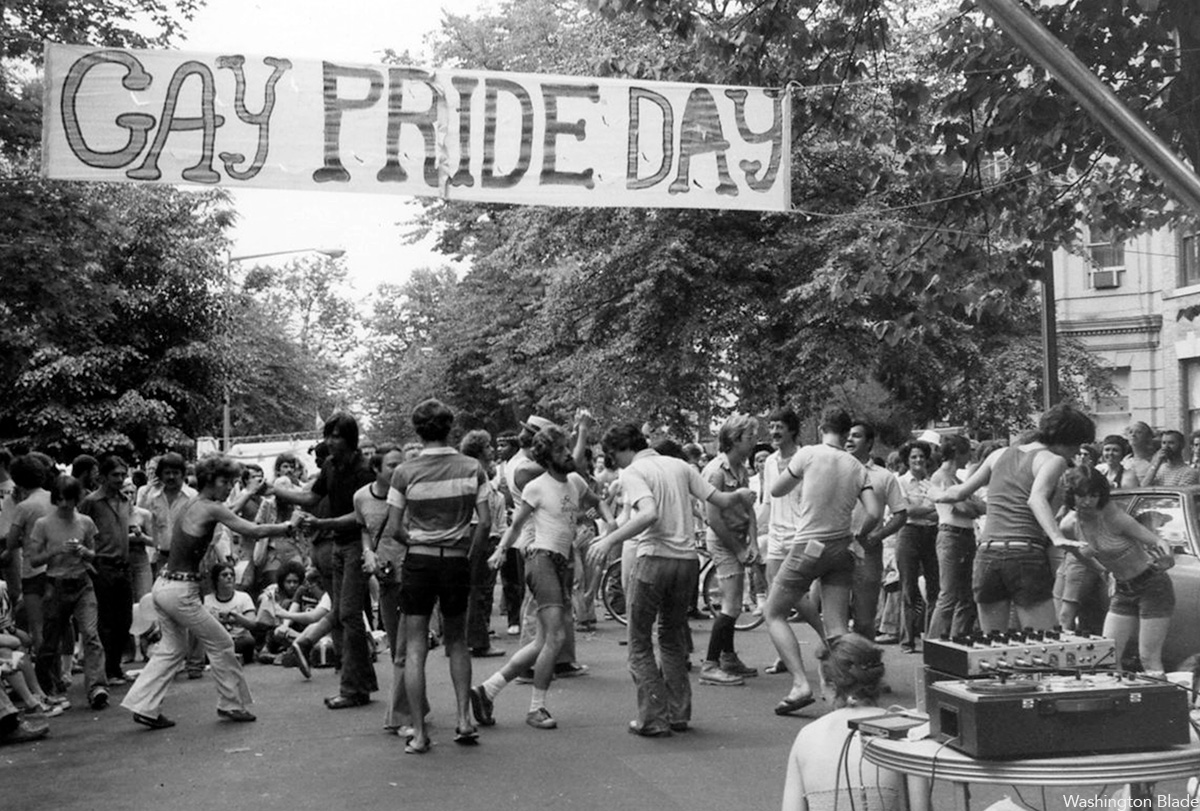
To celebrate the 50th anniversary of LGBTQ Pride in Washington, D.C., the Washington Blade team combed our archives and put together a glossy magazine showcasing five decades of celebrations in the city. Below is a sampling of images from the magazine but be sure to find a print copy starting this week.
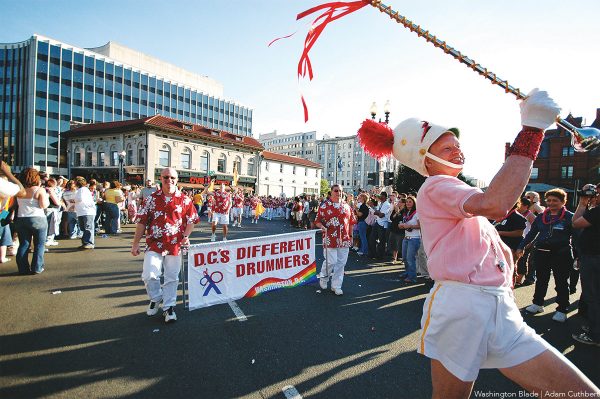
The magazine is being distributed now and is complimentary. You can find copies at LGBTQ bars and restaurants across the city. Or visit the Blade booth at the Pride festival on June 7 and 8 where we will distribute copies.
Thank you to our advertisers and sponsors, whose support has enabled us to distribute the magazine free of charge. And thanks to our dedicated team at the Blade, especially Photo Editor Michael Key, who spent many hours searching the archives for the best images, many of which are unique to the Blade and cannot be found elsewhere. And thanks to our dynamic production team of Meaghan Juba, who designed the magazine, and Phil Rockstroh who managed the process. Stephen Rutgers and Brian Pitts handled sales and marketing and staff writers Lou Chibbaro Jr., Christopher Kane, Michael K. Lavers, Joe Reberkenny along with freelancer and former Blade staffer Joey DiGuglielmo wrote the essays.
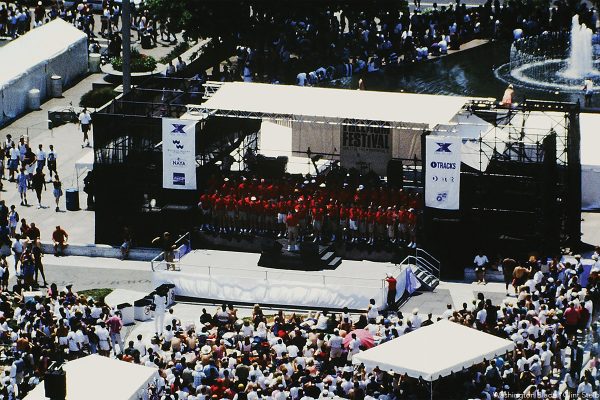
The magazine represents more than 50 years of hard work by countless reporters, editors, advertising sales reps, photographers, and other media professionals who have brought you the Washington Blade since 1969.
We hope you enjoy the magazine and keep it as a reminder of all the many ups and downs our local LGBTQ community has experienced over the past 50 years.
I hope you will consider supporting our vital mission by becoming a Blade member today. At a time when reliable, accurate LGBTQ news is more essential than ever, your contribution helps make it possible. With a monthly gift starting at just $7, you’ll ensure that the Blade remains a trusted, free resource for the community — now and for years to come. Click here to help fund LGBTQ journalism.
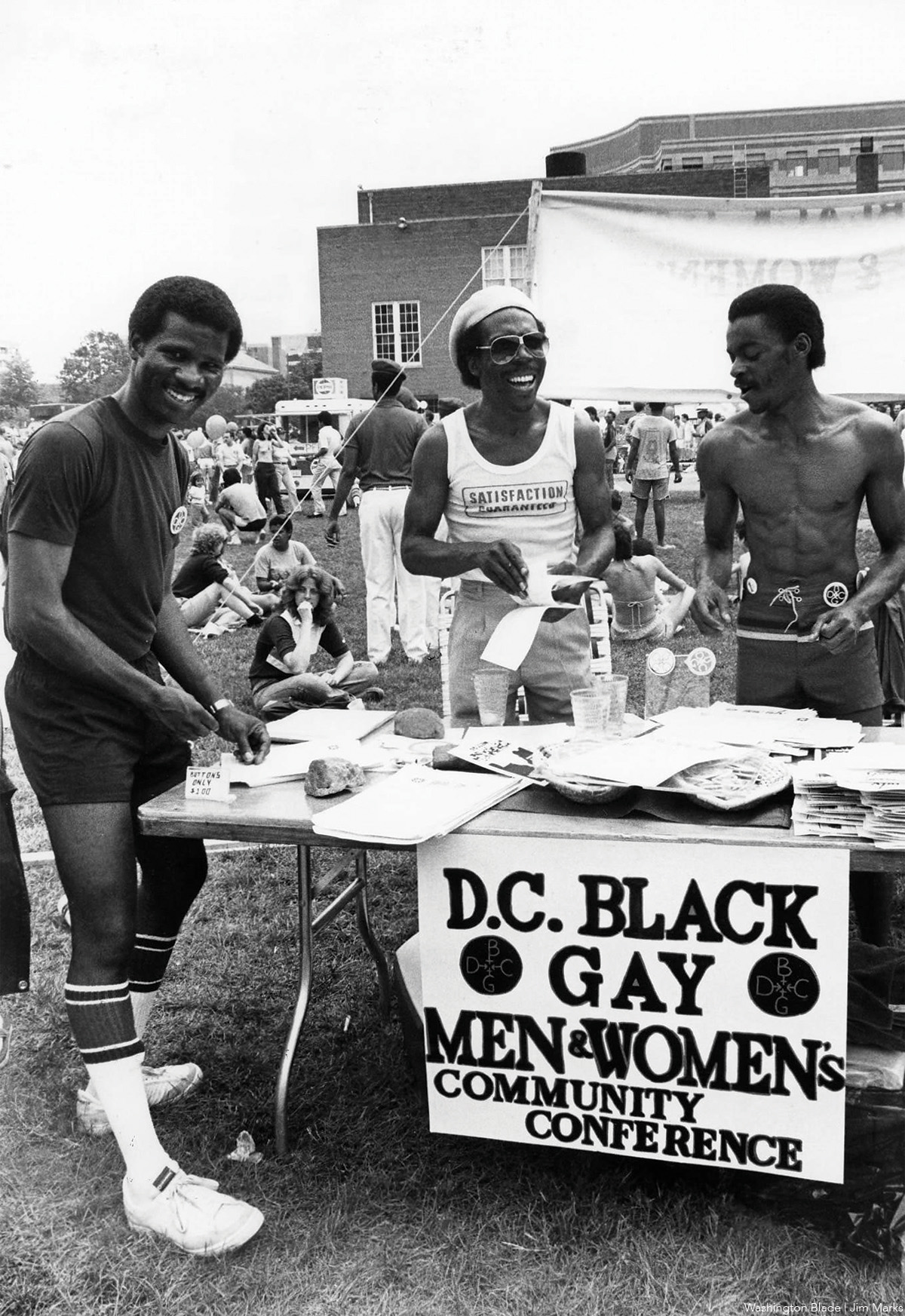
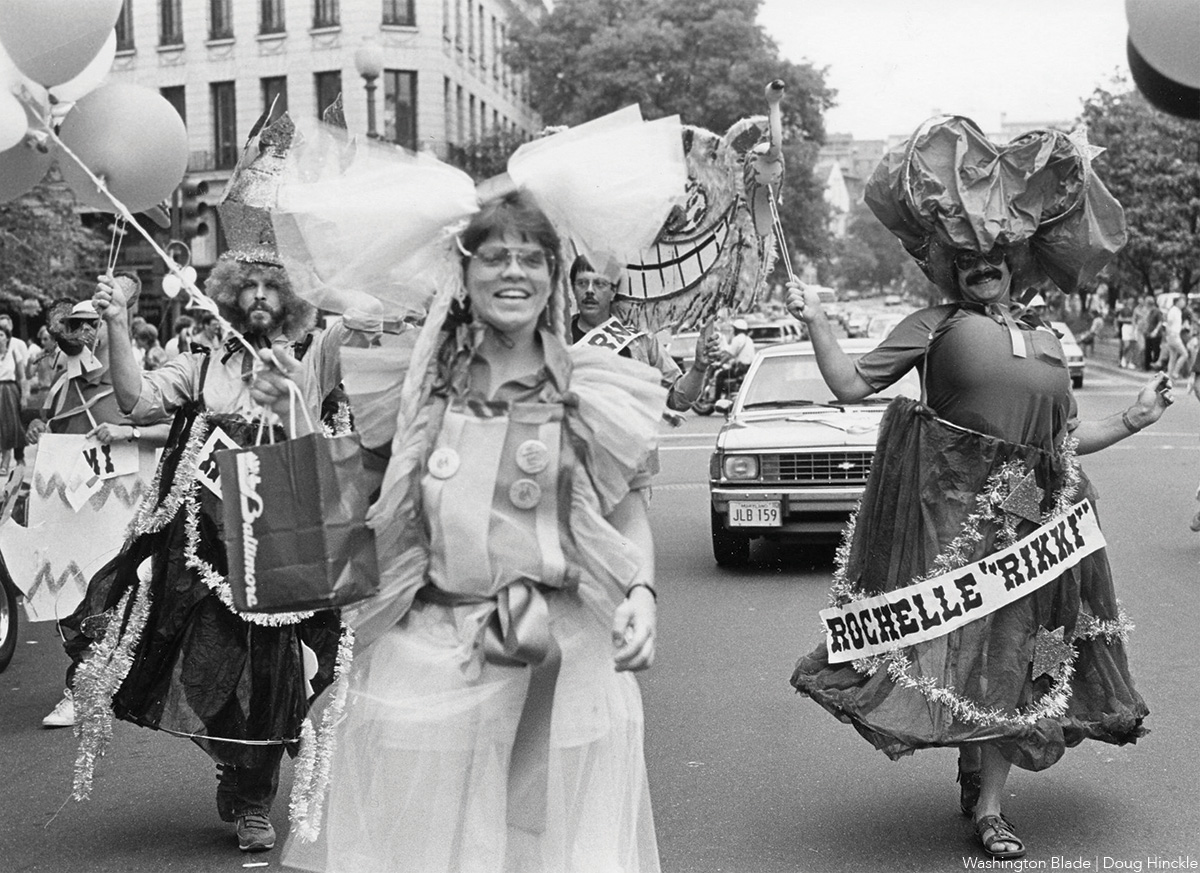
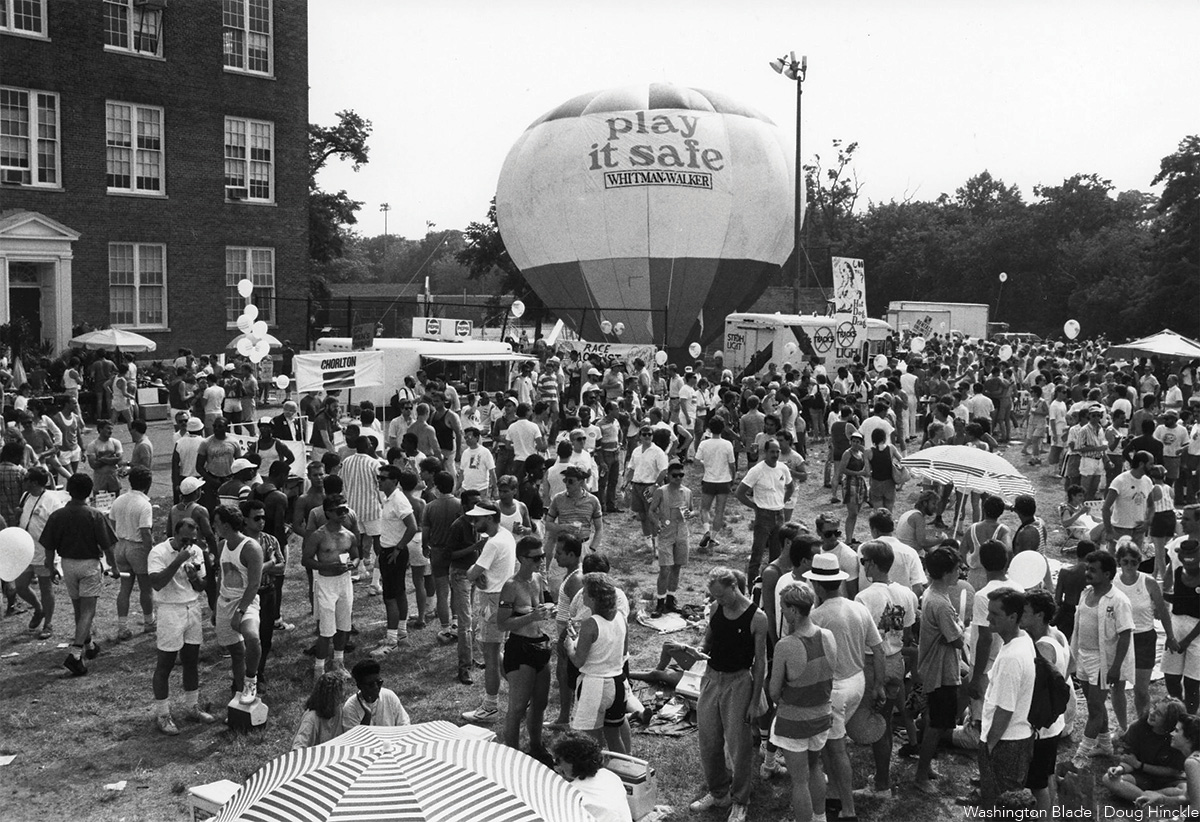
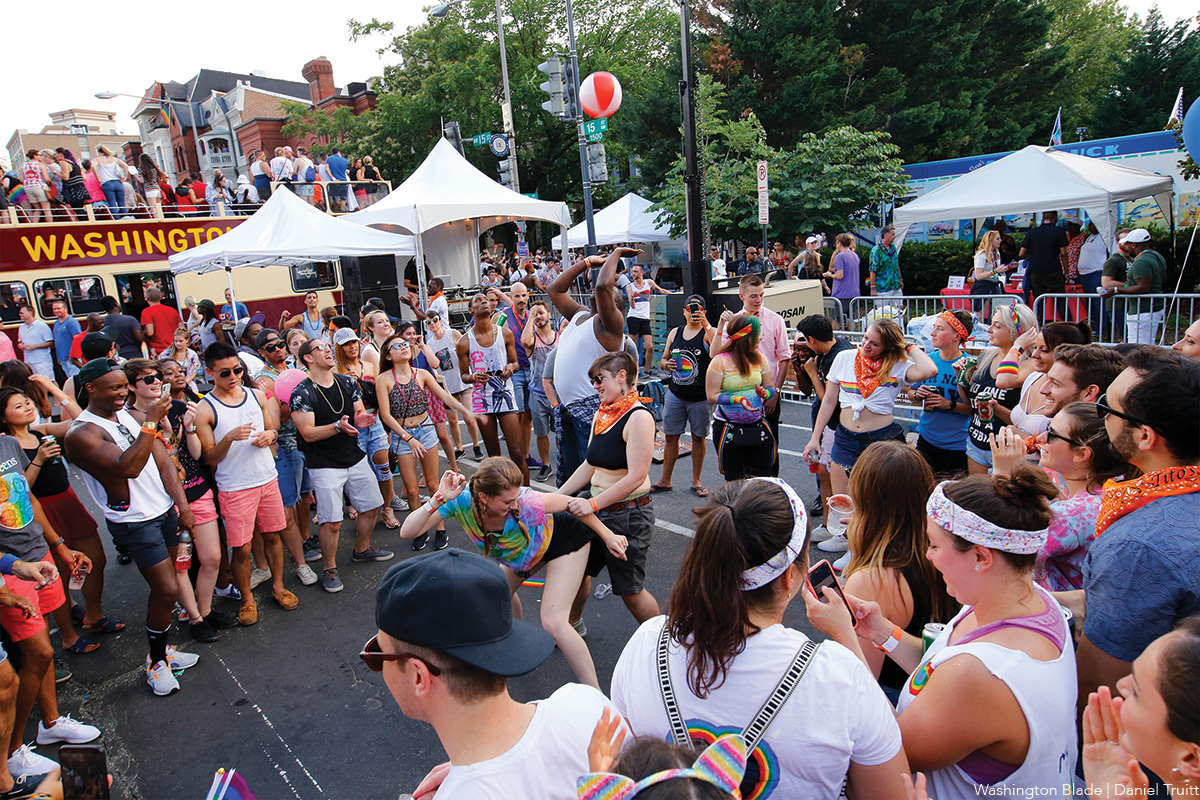
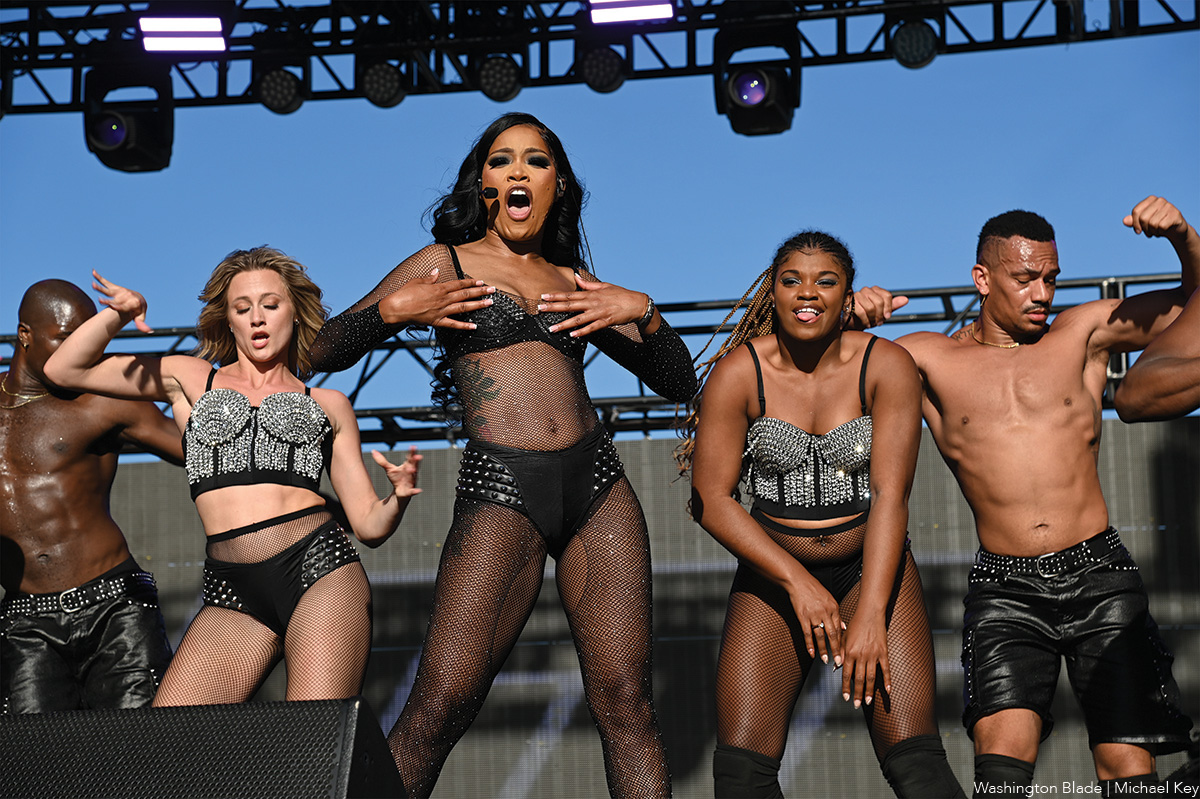
-

 U.S. Supreme Court4 days ago
U.S. Supreme Court4 days agoSupreme Court upholds ACA rule that makes PrEP, other preventative care free
-

 U.S. Supreme Court4 days ago
U.S. Supreme Court4 days agoSupreme Court rules parents must have option to opt children out of LGBTQ-specific lessons
-

 National5 days ago
National5 days agoEvan Wolfson on the 10-year legacy of marriage equality
-

 Congress5 days ago
Congress5 days agoSenate parliamentarian orders removal of gender-affirming care ban from GOP reconciliation bill












